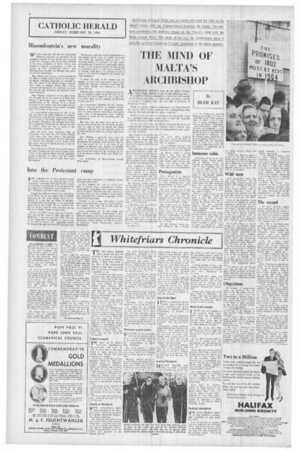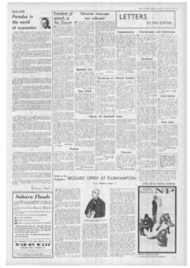Page 4, 28th February 1964
Page 4

Report an error
Noticed an error on this page?If you've noticed an error in this article please click here to report it.
Tags
Share
Related articles
Apartheid Statement Shock
Aloer. Whelan Confuses South Africa
• ...the English View
New Post For Mgr.
A Defence Of Abp.
Bloemfontein's new morality
WE have read the full text of Archbishop Whelan's statement on apartheid. As an academic exercise in nice distinctions, it would sound well enough at the North Pole.Uttered in the tense conditions of South Africa, and related to concrete circumstance, it seems to betray all that Archbishops Hurley and McCann have worked for through long years of sacrifice and struggle.
Mgr. Hurley has become a world symbol of the fight to bring human dignity to the underprivileged. Christian generosity, as revealed in the epic story of his Bantu schools, restores one's faith in human nature. His ringing, reasoned denunciations of apartheid have set the stage for the definitions we anxiously await from Vatican H.
Mgr. Whelan's statement, on the other hand, has brought joy to the enemies of God, confusion to the honest, and a deeper sense of abandonment to the African. It is a classic instance of how reason can he so right and yet so wrong, when divorced from historic actuality and "the reasons of the heart".
It is particularly unfortunate in view of the fact that there are some Catholics in southern African areas who err over racial matters every bit as much as the Dutch Reformed Church. In Southern Rhodesia, for instance, they have been repeatedly denounced by Bishop Lamont of Umtali. What are they to make of the Bloemfontein "manifesto" today?
One can have some sympathy with an Afrikaaner who feels that the South African whites have never been given a fair hearing abroad, and seeks to explain himself. Rut there are luxuries that bishops cannot afford, when they know that government practice, if not all of its theory, is evil.
The mind of the Church over racial matters has been forming over the years in many statements by the modern Popes and by individual bishops, especially in Africa and the United States. It may be as well to make clear what that mind is.
Theologians state that racial segregation is a sin against charity when it ''implies an exclusion from the common bond of love", by fostering hatred or contempt for the underprivileged race. Compulsory segregation implies disdain. When based exclusively on title of race it is mortally sinful in itself, and a mortal sin of scandal. And this is so, whether or not it leads to the kind of inequality we usually call "discrimination".
It denies the unity of the human race, its dignity in nature and supernature; and it contradicts the Christian revelation concerning the one origin, destiny and redemption of the human person.
Theoretically. a voluntary segregation involving no inequality might escape the guilt of sin. Partition in Cyprus might be such a case. But it is never ideal, as it is contrary to the bond of unity and love.
As a temporary expedient for the common good, it may be possible, in extreme circumstances, to tolerate even compulsory segregation. In some cultures, more harm than good might arise if de-segregation were suddenly imposed by force on the unwilling and the uninstructed.
But even then. the delay must not he protracted. Everything that can prudently be done must be done at once to remedy the whole situation. And the Church's doctrine must be proclaimed in full from the rooftops right from the start.
Mgr. Whelan is perfectly right when he points to Papal insistence on protecting and developing the separate racial cultures. But no Pope has asked for this to be done at the expense of national unity. Indeed, the thought of Pope Pius XII is a charter for inter-racialism and stresses the truth that the marriage of cultures produces a hybrid richer than either constituent.
The Archbishop of Bloemfontein should think again.
blog comments powered by Disqus











